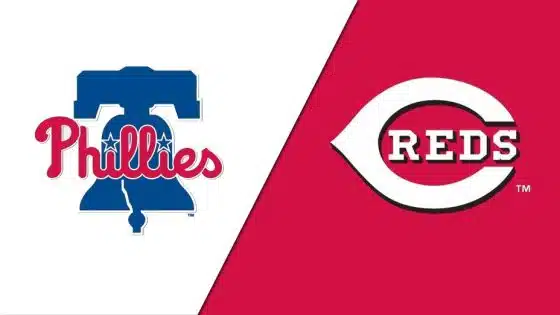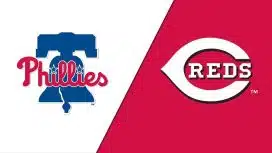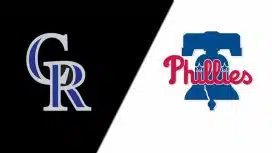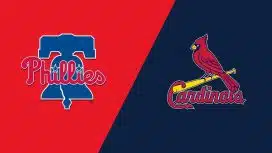By Tim Kelly, Sports Talk Philly editor
Scott Rolen may be most synonymous with the No. 27, but he did wear No. 17 from April 1997 until July 2002, when the Philadelphia Phillies traded him to the St. Louis Cardinals. So it's fitting that the highly talented, yet controversial third baseman comes in at No. 17 on our countdown.
When SportsTalkPhilly.com counted down the 25 greatest Phillies of all-time last winter, Rolen narrowly missed the countdown. But when you include his stints with the St. Louis Cardinals, Toronto Blue Jays and the Cincinnati Reds, Rolen became a lock for this list, and a serious Hall of Fame candidate.
Rolen played for four teams during his 17-year career, and racked up quite a few accolades in the process.
He won the National League Rookie of the Year in 1997, while playing with the Phillies. He made All-Star appearances while with the Phillies, Cardinals and Reds, totaling seven in his career. He also won Gold Glove Awards with all three of those teams, proving to be the best fielding third baseman of his era, and one of the best in the history of the sport.
Rolen only won the Silver Slugger Award once, but perhaps fell victim to playing much of his career in the National League, where soon-to-be Hall of Famer Chipper Jones normally played third base. During his career, Jones, Vinny Castilla, Mike Lowell, Adrian Beltre and even his future teammate Albert Pujols were among those to edge him out for the award.
While he didn't always stick out in the mind of awards voters, he does stick on many historical leaderboards, ones that point towards him being one of the 10 best third basemen ever:
| Rk | Name | WAR | WAR7 | JAWS | Yrs | ASG |
|---|---|---|---|---|---|---|
| 1 | Mike Schmidt HOF | 106.5 | 58.5 | 82.5 | 18 | 12 |
| 2 | Eddie Mathews HOF | 96.4 | 54.4 | 75.4 | 17 | 12 |
| 3 | Wade Boggs HOF | 91.1 | 56.2 | 73.6 | 18 | 12 |
| 4 | Adrian Beltre | 93.9 | 49.7 | 71.8 | 20 | 4 |
| 5 | George Brett HOF | 88.4 | 53.2 | 70.8 | 21 | 13 |
| 6 | Chipper Jones | 85.0 | 46.6 | 65.8 | 19 | 8 |
| 7 | Ron Santo HOF | 70.4 | 53.8 | 62.1 | 15 | 9 |
| 8 | Brooks Robinson HOF | 78.4 | 45.8 | 62.1 | 23 | 18 |
| 9 | Paul Molitor HOF | 75.4 | 39.6 | 57.5 | 21 | 7 |
| 10 | Scott Rolen | 70.0 | 43.5 | 56.8 | 17 | 7 |
| 11 | Edgar Martinez | 68.3 | 43.6 | 56.0 | 18 | 7 |
| Avg of 13 HOFers at this position | 67.5 | 42.8 | 55.2 | |||
| 12 | Graig Nettles | 68.0 | 42.3 | 55.1 | 22 | 6 |
| 13 | Home Run Baker HOF | 62.8 | 46.8 | 54.8 | 13 | 0 |
| 14 | Ken Boyer | 62.8 | 46.3 | 54.5 | 15 | 11 |
| 15 | Buddy Bell | 66.1 | 40.4 | 53.2 | 18 | 5 |
Quietly, Rolen was one of the best all-around players of his era. He didn't leave Philadelphia or St. Louis, the two most notable stops of his career, on good terms. There's no doubt that has hurt the way that his legacy is viewed. While his personal reputation might be tainted in the minds of some, there's only one thing you can say about Rolen's playing career – he was a damn good ballplayer.
Career Accomplishments
- 1997 National League Rookie of the Year
- Seven All-Star Game appearances (2002, 2003, 2004, 2005, 2006, 2010, 2011)
- Eight Gold Glove Awards (1998, 2000, 2001, 2002, 2003, 2004, 2006, 2010)
- 2002 Silver Slugger Award winner
- Member of 2006 World Series champion St. Louis Cardinals
*Awards were not factored into the formula
Career-Defining Moment
During his five-and-a-half seasons with the Cardinals, Rolen got a chance to play in two of the most classic NLCS series ever – 2004 and 2006. The Cardinals won both series in seven games. Though the 2006 National League pennant led to a World Series title, Rolen shined more in the run to the 2004 World Series, which came after the best regular season of his career.
Rolen probably had the finest playoff game of his career during Game 2 of the 2004 NLCS, as he went two-for-four with two runs scored and three RBIs in a 6-4 win. The Cardinals won the first two games of the series, and it looked as though they would cruise towards their first World Series appearance since 1987.
Instead, October baseball ensued.
The Astros won the next three games of the series, moving to within one game of their first World Series appearance in franchise history. The Cardinals blew a 4-3 lead in the ninth inning of Game 6, with future Hall of Famer Jeff Bagwell tying the game in the bottom of the ninth. Ultimately, Cardinals star center fielder Jim Edmonds forced a Game 7 with a walkoff home run in the 12th inning, finishing off one of the greatest games in the history of the National League postseason.
Rolen didn't send the Cardinals to the World Series with a walkoff home run in Game 7, but did have a team-high two RBIs, which came on a go-ahead home run against Roger Clemens, one of the three best pitchers in the history of the sport:
Though he was a better player than Edmonds, he wasn't quite as flashy and doesn't have as many memorable individual moments. And every player that played during the 2000s, maybe short of Alex Rodriguez and Barry Bonds, was overshadowed by the dominance that was Albert Pujols.
Rolen doesn't have on specific moment in his career that national baseball writers think of, which is perhaps why his career is so overlooked. But his Game 7 home run in the 2004 NLCS perhaps best sums Rolen's career up – quietly great in a big moment.
Reasoning for ranking
Rolen had 13 seasons with a bWAR of two of higher, earning him 13 points. He had four seasons with a bWAR of five or higher, netting him an additional 12 points. And then, Rolen was one of 16 players on the countdown with at least one season with a bWAR of eight or higher, having posted a 9.2 bWAR in 2004. That earned him another five points. From bWAR along, Rolen scored 30 points.
Rolen's .855 OPS is 156th in MLB history, so he earned one point for being the top 200 in league history.
His 517 doubles are 51st in MLB history, earning him one point for being in the top 200, two points for being in the top 100 and three points for being in the top 75. Had he been 50th all-time instead of 51st, he would have earned four more points for being in the top 50.
Believe it or not, Rolen's 316 home runs are 124th in MLB history. He actually has more career home runs than Edgar Martinez and Pudge Rodriguez, among others. Since he's in the top 200, he earned another point.
Finally, he earned his last point for being 120th all-time in RBIs, meaning he was again in the top 200.
In total, Rolen scored 39 points through our formula. This was actually more than Hall of Famer Tony Perez, and another Hall of Famer that came in one spot above Rolen.
As outlined below, historcial columnist Matt Albertson and I designed this formula, but understand that no formula is perfect. We didn't believe that Rolen belonged above the Hall of Famer that will check in at No. 16, but we did believe that he was better than Bobby Abreu, who came in at No. 18, despite scoring a 41 through our formula.
Previous Entries
- No. 25, Ryan Howard
- No. 24, Roy Oswalt
- No. 23, Kenny Lofton
- No. 22, Jimmy Rollins
- No. 21, Cole Hamels
- No. 20, Cliff Lee
- No. 19, Tony Perez
- No. 18, Bobby Abreu
Explanation of scientific formula
The player rankings formula combines both traditional and advanced statistics/metrics and assigns a point total to each category.





